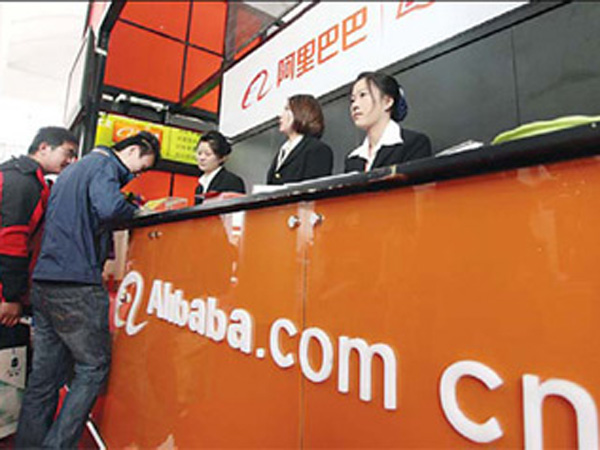



Date:05/07/11
 China needs to be vigilant in allowing foreign control of the country's Internet sector and needs to expand its regulatory clout, researchers with a Chinese think tank said Monday.
China needs to be vigilant in allowing foreign control of the country's Internet sector and needs to expand its regulatory clout, researchers with a Chinese think tank said Monday.
The recent dispute between Yahoo Inc. and Alibaba Group Holding Ltd. over the ownership of "Alipay," a key online-payments unit, has "fully exposed" the risks of Chinese Internet companies being controlled by foreign capital, Jing Linbo and Wang Xuefeng wrote in an essay in Study Times, a publication of the Communist Party School.
Jing is a deputy director at the Institute of Finance and Trade Economics at the Chinese Academy of Social Sciences, China's top think tank. Wang is a doctoral candidate at the same think tank. "The combination of capital and the Internet is a mighty controlling power. The Internet is a special industry--once it is controlled by foreign capital, the impact could be severe," the authors wrote."So far the issue of control has not been given sufficient attention."
China already imposes curbs on Internet companies, particularly those supplying content, though other areas, such as online payments have also come under the government's watchful eye. The recent dispute between Yahoo! and Alibaba over Alipay stemmed from regulatory worries over payment platforms controlled by foreigners.
Yahoo, a major shareholder in Alibaba, said in a regulatory filing in May that Alibaba transferred ownership of Alipay to a company owned by Alibaba Chief Executive Jack Ma without seeking board approval or notifying the U.S. company. Alibaba has said the transfer was legal and transparent.
"If we judge by the indicator that a foreign control of over 20% stake is relatively controlled, and over 50% is majority-owned, then most Chinese Internet companies that are listed offshore are controlled by international capital," the authors wrote."International capital thus controls our Internet industry." They also said the combination of capital and the Internet will have an impact on politics and the government, adding that China should strengthen supervision not only over a company's capital structure but also its business operations, including its dealings with related parties.
While the Chinese Academy of Social Sciences is an influential government organization, it is unclear how much support the views have among government regulators. Publication in Study Times, however, means that the Communist Party does not object to making the views known to a wider audience.
China should tighten curbs on foreign Internet firms - researcher
 China needs to be vigilant in allowing foreign control of the country's Internet sector and needs to expand its regulatory clout, researchers with a Chinese think tank said Monday.
China needs to be vigilant in allowing foreign control of the country's Internet sector and needs to expand its regulatory clout, researchers with a Chinese think tank said Monday.The recent dispute between Yahoo Inc. and Alibaba Group Holding Ltd. over the ownership of "Alipay," a key online-payments unit, has "fully exposed" the risks of Chinese Internet companies being controlled by foreign capital, Jing Linbo and Wang Xuefeng wrote in an essay in Study Times, a publication of the Communist Party School.
Jing is a deputy director at the Institute of Finance and Trade Economics at the Chinese Academy of Social Sciences, China's top think tank. Wang is a doctoral candidate at the same think tank. "The combination of capital and the Internet is a mighty controlling power. The Internet is a special industry--once it is controlled by foreign capital, the impact could be severe," the authors wrote."So far the issue of control has not been given sufficient attention."
China already imposes curbs on Internet companies, particularly those supplying content, though other areas, such as online payments have also come under the government's watchful eye. The recent dispute between Yahoo! and Alibaba over Alipay stemmed from regulatory worries over payment platforms controlled by foreigners.
Yahoo, a major shareholder in Alibaba, said in a regulatory filing in May that Alibaba transferred ownership of Alipay to a company owned by Alibaba Chief Executive Jack Ma without seeking board approval or notifying the U.S. company. Alibaba has said the transfer was legal and transparent.
"If we judge by the indicator that a foreign control of over 20% stake is relatively controlled, and over 50% is majority-owned, then most Chinese Internet companies that are listed offshore are controlled by international capital," the authors wrote."International capital thus controls our Internet industry." They also said the combination of capital and the Internet will have an impact on politics and the government, adding that China should strengthen supervision not only over a company's capital structure but also its business operations, including its dealings with related parties.
While the Chinese Academy of Social Sciences is an influential government organization, it is unclear how much support the views have among government regulators. Publication in Study Times, however, means that the Communist Party does not object to making the views known to a wider audience.
Views: 806
©ictnews.az. All rights reserved.Similar news
- 24% of U.S. Adults have made phone calls on the Internet
- UNESCO puts sustainable learning online
- Australia gives incentives for the use of telehealth
- US launches computer programme for poor kids
- UN declares web access as human right
- Facebook growth slows in stalkerbase heartlands
- One Third of Millionaires Use Social Media
- Facebook Seeks Bigger Role in Software for Mobile Apps
- Icann increases web domain suffixes
- IBM launches new social networking platform for enterprises
- Google Notches One Billion Unique Visitors Per Month
- Internet providers cut international channel renting costs by 60%
- Azerbaijan launches standard time on internet
- Icann launches facility to ease DNSSec adoption
- Social network data mining yields worrying results for traditional media





















